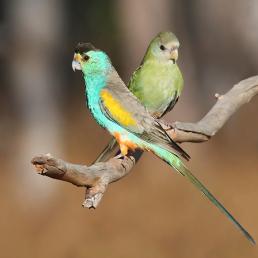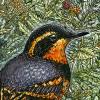

Join BirdNote tomorrow, November 30th!
Illustrator David Sibley and actor H. Jon Benjamin will face off in the bird illustration battle of the century during BirdNote's Year-end Celebration and Auction!
In New Guinea in the 1960s, scientist Jared Diamond documented birds like this Mountain Kingfisher living at all elevations on Mount Karamui. Today, scientists Ben and Alexa Freeman have documented an important change. Birds are moving “upslope” to escape warming temperatures that are disrupting their way of life. One author has called this the “Escalator to Extinction,” as species at the top are pushed up and off. Alexa is hopeful that humans will find ways to "live alongside of animals and plants in a way that sustains both at once.”
BirdNote®
Up and Off: How Birds on Tropical Mountains Are Responding to Global Warming
Featuring Ben Freeman and Alexa Class Freeman Ph.D.
Interview by Chris Peterson
This is BirdNote!
[Song of Yellow-browed Melidectes]
In New Guinea in the 1960s, scientist Jared Diamond documented the bird species living at all elevations on Mount Karamui [care-uh-MOO-ee]. More than 50 years later, scientists Ben and Alexa Freeman have documented an important change. The birds are moving “upslope” “…to escape warming temperatures that are disrupting their way of life.”(1) [Song of Yellow-browed Melidectes] Here’s Ben:
“It wasn’t just one or two species – it was almost all species were moving upslope quite a lot. The average bird species on Mount Karamui moved upslope by over a hundred meters.”
One author has called this the “Escalator to Extinction,” as species at the top are pushed up and off. (2) Yet with Papua New Guinea so far away, why should we care? Here’s Alexa:
“I think it’s an example of how we don’t live in a vacuum. Our lifestyle choices and our way of using resources in the environment, impact the entire globe.” [Call of Mountain Kingfisher]
Will we reduce our carbon emissions – the cause of the warming? Call it wishful thinking but just for a moment, imagine…
[“If governments are concerned about things like watersheds and land use and people’s health and the future ability to sustain livelihoods and crops and healthy populations of everything, I think that is the stable strategy”] “…trying to not only protect the resources that humans need, but perhaps contemplate how humans can live alongside of animals and plants in a way that sustains both at once.”
To see and hear some beautiful birds that invite us to do so, join us at birdnote.org [Song of Yellow-browed Melidectes]
###
Bird sounds provided by The Macaulay Library of Natural Sounds at the Cornell Lab of Ornithology, Ithaca, New York. Song of Yellow-browed Meledictes recorded by Alexandra M. Class; call of Mountain Kingfisher [168367] by Thane K. Pratt; ambient drawn from Black Sicklebill [163718] recorded by Thane Pratt; Ribbon-tailed Astrapia [107097] recorded by Eleanor Brown.
BirdNote’s theme music was composed and played by Nancy Rumbel and John Kessler.
Producer: John Kessler
Executive Producer: Chris Peterson
© 2014 Tune In to Nature.org June 2014 Narrator: Michael Stein
ID# climatechange-02-2014-06-30 climatechange-02 Marantz V Tracks 512, 518, 521
1) and 2) Cornell Lab of Ornithology News Release: Climate Change Pushing Tropical Birds Off the Mountaintop. Gus Axelson, Cornell Lab of Ornithology, (607) 254-1135, [email protected] lead author
A pdf copy of the Freemans’ research paper, entitled “Rapid upslope shifts in New Guinean birds illustrate strong distributional responses of tropical montane species to global warming,” can be viewed and downloaded at https://www.pnas.org/doi/10.1073/pnas.1318190111#:~:text=Temperatures%2… research was funded by the National Science Foundation, the Athena Fund of the Cornell Lab of Ornithology, and the Explorer’s Fund.






